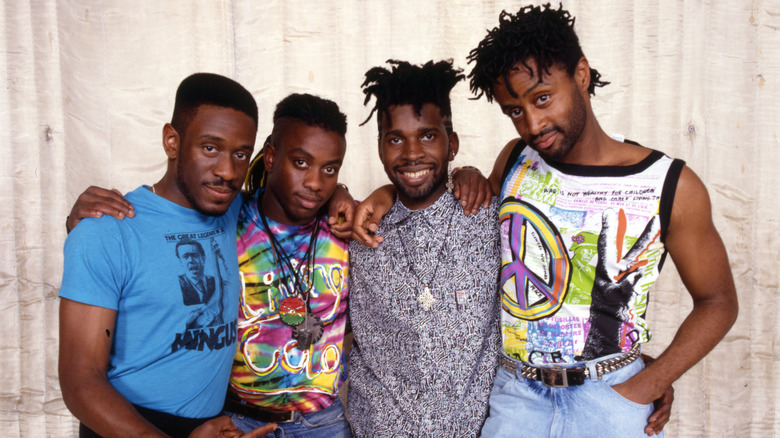The Untold Truth Of Living Colour
In 1988, Living Colour's career changed forever with the release of their debut album, "Vivid." While the record itself was embraced by critics and fans, it was the Grammy Award-winning single "Cult of Personality" that catapulted them to the next level. To this day, the song about idealization and idolization remains a staple part of pop culture, and fans recognize the combination of the jagged riff and iconic drumbeat as soon as it hits the speakers. The track continues to be played at sporting events, featured in video games such as "Grand Theft Auto: San Andreas" and "Guitar Hero III: Legends of Rock," and closely associated with professional wrestler CM Punk, who uses it as his official entrance music.
Living Colour is no one-hit wonder, though. The New York City rock group released several albums and performed regularly (except for the five years when they broke up), reminding everyone of why they are still one of the most must-see bands on the planet. In this time, they have also built up a fanbase that has included musical legends such as Prince and the Rolling Stones' Mick Jagger. Although, it often feels as if they are more respected by their peers than the rest of the music industry.
They might not always get the flowers they deserve for changing the face of rock for the better, but Living Colour has always done things their own way and rebelled against what others think they should do. Underrated? Yes. But never undetermined.
The issue between Living Colour and Guns N' Roses
When it comes to controversy, Guns N' Roses shakes hands with scandal. The rock band, especially lead singer Axl Rose, is never far away from the headlines and often feuds with other artists. In 1990, an issue between GNR and Living Colour heated up, largely due to the song "One in a Million," which was off the 1988 GNR record "G N' R Lies."
The track features racial and homophobic slurs that attracted a lot of attention for GNR at the time. Living Colour guitarist Vernon Reid weighed in on the topic and called out the lyrical contents of the track in an interview — something Rose took issue with when the bands toured together a while later, as Living Colour's ex-bassist Muzz Skillings told the Los Angeles Times. Skillings explained how he was backstage waiting to watch GNR take the stage when he was confronted by Rose. Skillings said: "First thing out of his mouth: 'You got a problem with me, man?' I said, 'What you talking about?' So then he goes on, 'It's in the media that I'm some sort of racist, man ... I ain't no damn racist.'" According to Skillings, the pair agreed they would talk after the show.
However, Rose went on stage and proceeded to defend himself and the song's lyrics further. The next night, Reid responded, using his band's platform to fight against homophobia and racism before launching into "Cult of Personality."
The Rolling Stones' Mick Jagger had a hand in helping the band out
While anyone with a set of ears could tell Living Colour had the "it" factor in their music, the band also received a helping hand from one of the rock genre's biggest figures: Mick Jagger of the Rolling Stones fame. The relationship began when Vernon Reid auditioned for Jagger's solo project as the Stones' frontman decided he wanted to assemble a backing band of New York musicians. While the guitarist didn't think his audition went very well, his ability and his band's reputation caught the attention of Jagger, who went to watch Living Colour play at the CBGB club in New York City.
Jagger didn't stop there, though. He admired the band to the extent that he produced their demo and helped get them signed to Epic Records for their debut album, "Vivid." Jagger's intervention in the course of their musical destiny proved to be a case of right place, right time, as they had been considering going the independent route after a number of rejections from other labels in this period.
"We had faced a lot of disappointment," Vernon Reid told Red Bull Music Academy. "We got turned down a lot. We were looked at by Elektra, and the president of Elektra said, 'I don't like this band.' We were looked at by Warner Brothers and they passed, you know, and what eventually happened was that we got taken on by Sony."
Living Colour's Doug Wimbish was invited to join the Rolling Stones
After the departure of Muzz Skillings, Doug Wimbish joined Living Colour as their new bassist in 1992. Wimbish came with a big reputation and impressive track record, as he had performed with a variety of musicians over the years — including a certain Rolling Stone named Mick Jagger. In fact, Wimbish contributed to Jagger's 1987 solo album, "Primitive Cool," and went on tour with him as part of his backing band. This relationship with Jagger would see him interacting with other members of the Rolling Stones over the years too, and he was even invited to join the band as their bassist after the departure of Bill Wyman.
Speaking to Rolling Stone, Wimbish revealed how Jagger called and invited him to come out to Ronnie Wood's house, which he did. "And then I go back to New York and Mick calls me up. 'Hey, we'd like for you to come and do it. We're doing a record.' It was like October of 1993. I'm like, 'OK, well, Living Colour is booked to play Australia at that time. I'd love to do it, but we have this tour.'"
Wimbish admitted it was a tough decision that he went back and forth about, but he chose to be loyal to Living Colour in the end. "Lo and behold, things get dark in 1994 and Vernon [Reid] breaks the band up in 1995," Wimbish quipped.
The band's social commentary goes beyond the Black community
In a time when African American rock bands were few and far between in mainstream music, many saw Living Colour as carrying the flag for the Black community (even though rock 'n' roll was actually created by Black artists to begin with). Coupled with the politically charged nature of their songs, this meant they were sometimes heralded as the voice of the marginalized. However, the band has always been uneasy with labels concerning what they are meant to be, or who they represent.
As drummer Will Calhoun told Will Not Fade, Living Colour's music goes beyond the Black experience and the challenges the community faces. "These songs go beyond the Black community. They deal with the Māori community," he said. "The Aboriginal community in Australia. The Native American communities and Indigenous communities around the world. They're not relegated to Black and white issues. Some of our songs deal with gender, discrimination, chauvinism, bullying, and those kinds of things."
Calhoun added how their music is meant to unify and not divide. They want to create inclusive songs that connect with everyone from all walks of life rather than appeal to a specific demographic.
Why there was a major delay between Collideøscope and The Chair in the Doorway
The 10-year delay between 1993's "Stain" and 2003's "Collideøscope" is understandable since Living Colour broke up in 1995 and only started performing together again in 2000. However, the six-year delay between "Collideøscope" and 2009's "The Chair in the Doorway" still puzzles fans. Vernon Reid pulled back the curtain to Innerviews, revealing there were several factors that contributed to the lengthy delay.
The guitarist explained how the band felt unsupported by their then-label, Sanctuary, as they failed to secure coverage or airplay for their music in America. As a result, they spent more time touring in foreign territories where they experienced more success in this period. At the same time, there was also uncertainty about whether this was a full-fledged Living Colour comeback or not.
"The notion of Living Colour coming back again has been contested inside the band, though not in a neck-vein-popping-out kind of way," Reid said. "When we first returned in 2003, I asked, 'Why are we doing this? Is it just to cage gigs?' I had similar concerns this time. I don't think bands should exist just because they can." Ultimately, the band stayed the course, but they continued this trend of big delays between albums, as it took eight years to release 2017's "Shade" after "The Chair in the Doorway."
Living Colour didn't see the initial success of Cult of Personality
Without question, "Cult of Personality" turned everything around for Living Colour. Even though it wasn't a chart-topping song when it was released in 1988, it hit the Top 20 in America as well as the Top 100 in the U.K. while slowly carving out its place in the public consciousness. It all culminated in the band winning the Best Hard Rock Performance Grammy in 1989 for "Cult of Personality." Even so, the lack of support from radio initially had the group questioning if they would ever be able to take the next step in their career, regardless of how critically acclaimed "Vivid" and "Cult of Personality" were.
As Vernon Reid told Bomb, they were so busy grinding and touring the record in any place they could that they weren't able to enjoy the moment when the song truly took off. "We would go into [small-town] record stores," he said. "We're like selling hundreds of thousands of records, but there would be no display up. Here we are, supposed to be famous, but in this little town we're invisible. Then, all of a sudden, everybody knew about us. But it was like walking through a door. It's very surreal."
They don't actually hate Elvis Presley
Considering the title of the song "Elvis Is Dead" and lyrics such as "Elvis was a hero to most, but that's beside the point. A Black man taught him how to sing and then he was crowned king," one would presume Living Colour weren't fans of Elvis Presley when they wrote this song for their 1990 sophomore album, "Time's Up."
However, that isn't the case, as former bassist Muzz Skillings told The Washington Post in 1991. "The whole idea of king-making in music is odd and unfair," he said. "You know, Elvis Presley was great, but because of the politics and racial climate of this country, he was able to benefit from mass exposure and be touted as the King."
In an interview with Paste in 2017, Vernon Reid once again emphasized that "Elvis Is Dead" wasn't a damnation of Elvis at all. He added how other artists such as Public Enemy straight-up called Elvis racist, but that wasn't the intention of their song to begin with.
How the band manages to stay friends
The music industry can be a cruel and unfair place where talent doesn't always rise to the top. Having experienced the ups and downs of being in a band for four decades, Living Colour has seen it all — yet, they still manage to stay friends when the lights go off and the instruments are unplugged.
According to lead vocalist Corey Glover, there's a simple way to maintain relationships with bandmates: "Staying away from them as much as you possibly can," he jokingly told The Travel Addict. "We have been in each other's lives for the better part of 40 years at this point. We understand each other and we understand each other better than we think we do in most cases. We anticipate what any of us are going to say or do."
Vernon Reid added his thoughts on the topic, telling Paste that the band has gotten to a good place where they communicate better — like they used to in their early days. He admitted it could still be tough and they argue about all sorts of band-related issues, but they are more open and transparent with each other.
The truth behind Cult of Personality
The spoken-word intro of "Cult of Personality" features edited parts of activist and civil rights leader Malcolm X's famous "Message to the Grass Roots" speech, stitched together to say: "And during the few moments that we have left, we want to talk right down to earth in a language that everybody here can easily understand." However, this section could have featured another quote from a different Black civil rights icon altogether.
Speaking to Billboard, "Vivid" producer Ed Stasium said, "The original choice for the beginning phrase of 'Cult of Personality' was Martin Luther King's 'Free at last, free at last, thank God Almighty we are free at last.' But [his wife] Coretta Scott King would not allow us to use it, so we ended up using the Malcolm X quote." That said, Stasium added how he believed Malcolm X's words better suit the song's overall theme in the end.
Interestingly enough, "Cult of Personality" is a song that came together incredibly quickly. Living Colour vocalist Corey Glover revealed to The Rockpit that the group wrote the song in less than eight hours; however, that wasn't always the case with a lot of their music.
Prince was a fan of Living Colour
Not only did Living Colour impress Mick Jagger with their delectable fusion of hard rock, punk, metal, and funk, but they also found a massive supporter in Prince. It should come as no surprise, though, since the musician also experimented with genres to create his own distinctive and influential sound.
Vernon Reid told Guitar World that Prince was a Living Colour fan and they encountered each other on more than one occasion. "I did have a couple of moments with him," he said. "I wish we'd had more moments, you know? He liked the band. He would come see us. He would mysteriously appear and then he would mysteriously disappear, which always made me mad."
In a separate interview with Billboard, Reid revealed that Prince came to a Living Colour show in Minneapolis before he died in 2016. Reid added how he didn't know Prince was at the venue until after the performance, when he was approached by the singer's bodyguard, who told him that Prince enjoyed Living Colour's set on the night.
Living Colour blasted Rolling Stone magazine's co-founder
In September 2023, Rolling Stone magazine co-founder Jann Wenner was interviewed by The New York Times, where he spoke about his book "The Masters" and the decision to only focus on white male performers. He made shocking comments about women and people of color in his interview, which resulted in widespread and rightful criticism from the music industry and his subsequent removal from the Rock & Roll Hall of Fame Foundation board. Later, Wenner apologized for his comments.
Living Colour wasn't about to let him off the hook easily, though. Taking to their social media accounts, the band posted a statement that condemned Wenner's comments and attitude, while also pointing out that his views are symptomatic of a bigger issue in society that needs to be addressed. They also expressed how his apology only further exposed his myopic view of music and the world as a whole.
"To hear that he believes Stevie Wonder isn't articulate enough to express his thoughts on any given subject is, quite frankly, insulting," Living Colour wrote. "To hear that Janis Joplin, Joni Mitchell, Tina Turner, or any of the many [women] artists that he chooses not to mention, are not worthy of the status of 'Master,' smacks of sexist gatekeeping, and exclusionary behavior."











